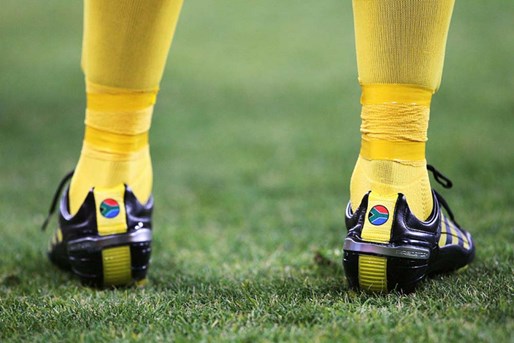Who will pay for South Africa’s longstanding mess?

The suspension of five South African football officials in December comes as no suprise, says Osasu Obayiuwana. Photo by Articularnos.com/Flickr
04.03.2013
By Osasu Obayiuwana , journalistThat five South African Football Association (SAFA) officials, including its president, Kirsten Nematandani, were suspended in December 2012, following FIFA’s investigation into match-fixing, may have come as a huge shock to ordinary followers of the game.
But not to informed commentators of African football, considering the recurring allegations of corruption and bribery that have been made in the country over the last 15 years.
FIFA’s 500-page report revealed that matches against Thailand, Bulgaria, Colombia and Guatemala, in the weeks running into the 2010 World Cup finals, were pre-arranged to benefit an Asian betting syndicate.
As was the case with Zimbabwe, convicted Singaporean match-fixer Wilson Raj Perumal, and his Football 4U organisation, also played a central role in the appointment of dishonest referees, who ensured that results were skewered for the syndicate.
Besides Nematandani, only in the SAFA job for a few months, at the time the dubious friendlies were played, others under a cloud of suspicion include Dennis Mumble, the acting Chief Executive, National Teams manager Lindile Kika, Referees boss Adeel Carelse and Bafana-Bafana manager Barney Kunjane. Their suspensions were lifted in January.
Operation Dribble
South African football has been dogged by allegations of wrongdoing since the late 1990s, especially after the formation of the Premier Soccer League (PSL) in 1996, which saw huge inflows of cash generated by lucrative TV deals – the $235m five-year contract, with satellite TV broadcaster SuperSport, being the most recent one – coming into the sport.
Previous commissions into corruption and bribery, within the domestic game, have failed, disappointingly, to deliver results, after being trumpeted as heralding an overdue clean-up of the game.
The 1996 Justice Pickard Commission of Enquiry, inaugurated to examine controversial practices in SAFA, headed by the late Solomon Morewa, was one of them. (Download the Pickard Commission Report here)
After the Pickard Commission, it was another eight years before “Operation Dribble” was launched, in June 2004, to deal with match-fixing in domestic football.
Despite the early promise shown, when over 40 arrests, involving club bosses, match commissioners and referees, were made by the police, only four insignificant match officials were convicted of attempting to alter the outcome of matches.
It suffered the same fate as The Motimela Commission, which took place five years ago and disclosed that many top officials in the South African game were guilty of corruption and recommended their expulsion from the game, as well as their prosecution in the courts.
But, as was the case with Operation Dribble, the report was not publicly released.
Molefi Oliphant, SAFA president during the period of the Motimela Commission, claimed the public release of its findings would expose the organisation to litigation.
Nematandani told me SAFA would not be revisiting the contents of that damaging report during his tenure.
“I don’t think that is something I should go back to, as the president [of SAFA].
At the time the decision was taken [not to make the Motimela report public], they certainly must have sought legal advice, which led them to the decision that they took...”
Threats of suspension led to revelation
Fierce critics of corruption inquiries have rightly questioned why no action was taken after club officials were caught, red-handed on video, paying bribes to officials, or when respected members of the South African football community revealed to police, under oath, the names of people known to be involved in corruption.
“I agree that it is important to go back to some of those things. As to why they were handled in the way that they were, I am not the best person to answer those questions. It’s unfortunate that they (the findings) did not go to the level that they should have. It is important to confront issues,” Nematandani told me.
But SAFA’s less than combative approach to eradicating corruption was further highlighted by the fact that it was only FIFA’s threat of an embarrassing suspension from international football - with just weeks to their hosting the recently concluded Africa Cup of Nations - that compelled them to act on the recent revelations.
News of the match-fixing allegations came shortly after Phil Setshedi, a former star defender with leading clubside Orlando Pirates and an assistant national coach to Clive Barker - when South Africa won the Cup of Nations in 1996 - became the first person in the country to be convicted for match fixing.
Nicknamed “Mr Jones”, Setshedi was convicted in a Cape Town court “after being found guilty of an attempt to unduly and improperly influence the outcome” in play-offs for promotion to the second tier of the national league.
According to Paul Ramaloko, a spokesman for The Hawks, South Africa’s elite crime-fighting unit, the police are poised to arrest prominent officials in connection with the match-fixing scam, believed to involve $1m in bribe payments.
“The arrests will shake South African football to its core,” he promised.
The local police, in cooperation with Interpol, are currently sifting through incriminating documents seized during raids on several SAFA officials’ offices and homes, as well as the offices of foreign football associations.
One can only hope that the Judicial Commission of Inquiry, to be headed by a respected retired judge, will finally rid the South African game of corruption and dodgy characters.
Burying another series of revelations is just not an option.
**Many thanks to my colleagues, Steve Vickers (from Zimbabwe) and Mo Allie (South Africa), for providing additional information for this report.
Read also: Kill corruption, before it destroys football
Osasu Obayiuwana, the Associate Editor of the London-based monthly magazine, NewAfrican and the editor of Footballisafrica.com, is one of the world’s leading writers on African football. He is a regular broadcaster for the BBC World Service and SuperSport, the pan-African channel.





